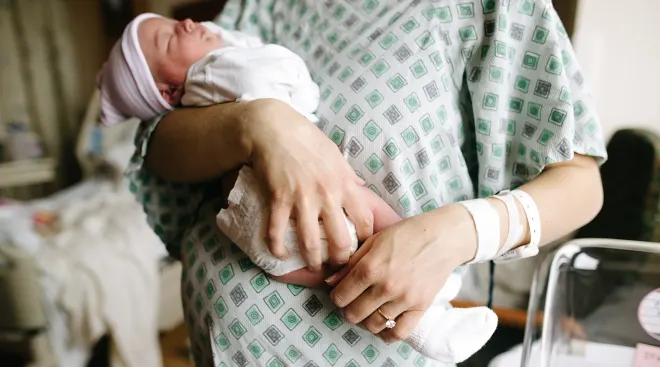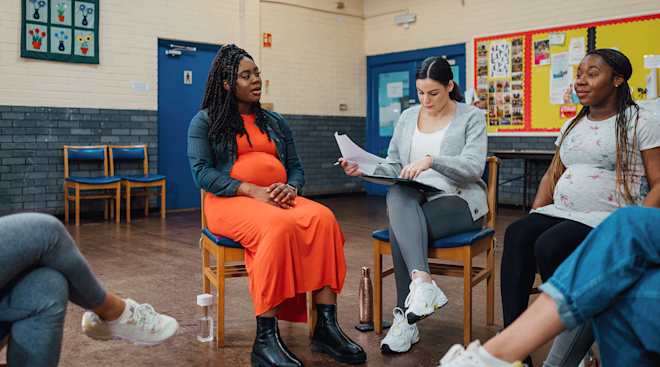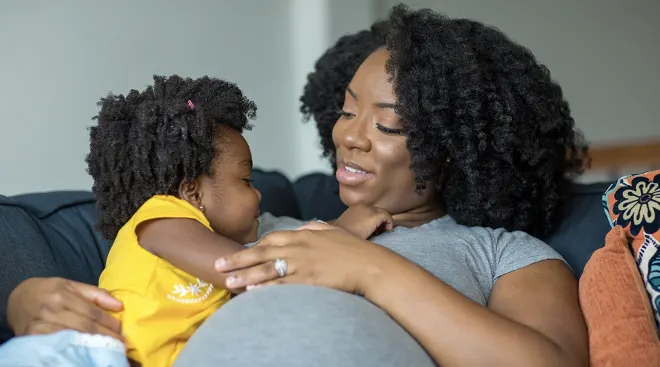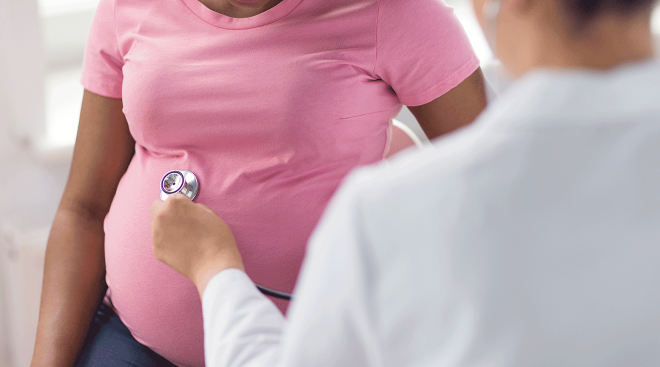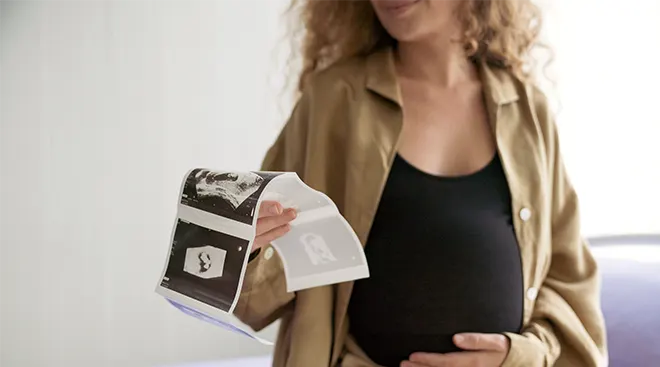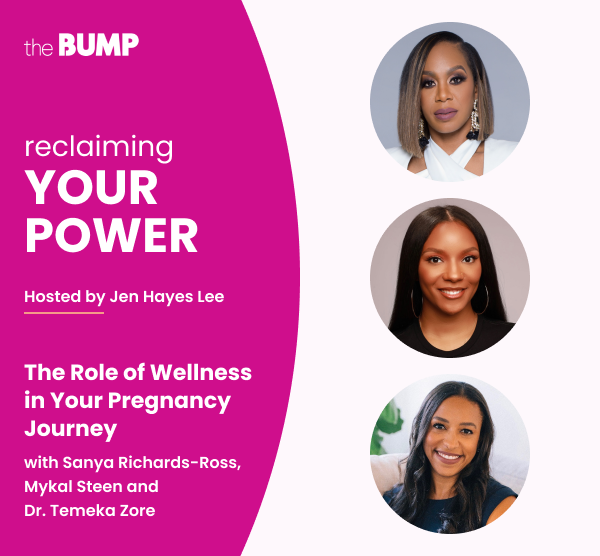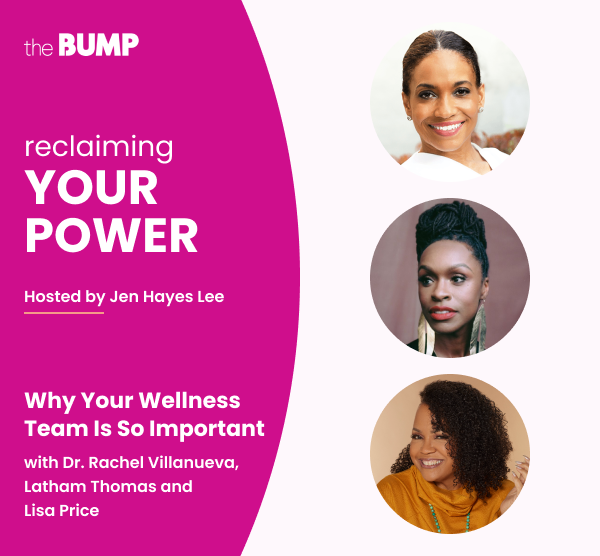Help Protect Newborns From RSV
Even before baby arrives, parents do a lot to help prepare for their little one’s future—from setting up the nursery and choosing a pediatrician to checking and double-checking that the car seat is properly installed. Being proactive about your children’s health can play a huge part in parenting, and there’s a way to help protect newborns from respiratory syncytial virus (RSV), aka the number one cause of infant hospitalizations in the US, from their very first breath.
Pfizer’s ABRYSVO® (Respiratory Syncytial Virus Vaccine) is a vaccine given during pregnancy that can help protect newborns from first breath through 6 months of age against serious sickness due to RSV, which can be dangerous for babies. According to the Centers for Disease Control and Prevention (CDC), infants’ and newborns’ developing immune systems and smaller airways and lungs can make them more prone to potential complications or severe illness from respiratory viruses. Approximately 2 to 3 out of every 100 infants under 6 months are hospitalized with RSV every year. Expecting mothers can be vaccinated with ABRYSVO during 32-36 weeks gestational age, helping them pass antibodies along to the baby through the placenta. These antibodies can help protect the baby for 6 months after birth—a crucial time, as most RSV hospitalizations in the first year of life occur during the first 6 months.
Michelle Vichnin, M.D., a board-certified OBGYN and the global maternal immunization medical affairs lead at Pfizer, notes that “more than 50% of all RSV-related hospitalizations in the US that take place in the first year of life occur during the first 3 months. Vaccination during pregnancy can help protect the infant from severe cases of RSV disease.”
One less shot for your baby and protection against complications from a potentially dangerous virus from first breath? Sounds like a win-win. Here’s what you need to know about ABRYSVO, along with one first-time mom’s experience choosing to receive the vaccine while pregnant to help protect her baby against RSV.
ABRYSVO is the first and only maternal RSV vaccine approved to be given during pregnancy at 32 through 36 weeks gestational age to help prevent RSV in infants from birth through 6 months of age. However, not all parents are aware of the opportunity to get vaccinated during pregnancy. Pfizer partner and first-time mom to an 8-month-old son, actress Chloe Bridges—known for Pretty Little Liars and Camp Rock 2—learned about the vaccine from her doctor during a routine prenatal visit.
“Frankly, I didn’t know much about it at the time,” Bridges admits. However, after learning more about the vaccine and the risks of RSV from her doctor, Bridges and her husband, fellow actor Adam DeVine, decided maternal vaccination was the best choice for their baby.
ABRYSVO was approved by the US Food and Drug Administration (FDA) in 2023 based on the results of scientific studies, including completion of a phase 3 clinical trial.
“I did a little bit of research, and I now know that RSV can be a very scary, highly contagious respiratory virus and that it’s the leading cause of infant hospitalization in the US. That was enough for me to be like, yes, let’s get [me] vaccinated,” she says.
Pregnant people are eligible to receive the ABRYSVO vaccination if they are:
- 32 to 36 weeks pregnant during September through January (in most of the US)
- Not allergic to any of the vaccine’s components
The vaccine is recommended from September through January to maximize infant protection during RSV season in most states. However, some areas in the US—especially southern Florida, Alaska, Hawaii, and the US territories—do not always follow typical RSV patterns. If you live in those areas, talk to a doctor about the best time for vaccination.
It’s always best to discuss options with an OBGYN or other healthcare provider. For Bridges, who was already juggling the influx of new information and decision-making that comes with pregnancy, having a doctor she could trust was a relief. “I feel like when you’re pregnant, especially for the first time, it is just sort of a whirlwind of feelings, and also you’re learning about all these things that you’ve never heard about before,” Bridges shares. “I felt like all of my pregnancy I was learning a new thing every day.”
Bridges’ doctor informed her about ABRYSVO and answered all of the questions she had about getting vaccinated. “My doctor was amazing. She always made me feel like I could ask any questions,” she explains. “I was really grateful to her for bringing up the vaccine, but also in general for all of her help on all of the decisions that had to be made.”
Talking to your doctor can help you make the best decision for your baby.
Vaccines can be given in many OBGYN offices or at a local pharmacy, like Chloe did. “For me, it was very easy to get,” Bridges shares.
The clinical trial for the vaccine showed that the most common side effects were muscle soreness, irritation at the injection site, headache, and nausea. There were also some other reported differences between placebo arm and vaccine, such as a slightly increased rate of jaundice and low birth weight in babies whose mothers received the vaccine.
"I didn’t have any side effects, though I do understand others may have a different experience,” Bridges added.
Now well past the newborn stage, Bridges reports that her son, Beau, is healthy, sleeping well (thankfully), and crawling. She says she is very glad she chose to get vaccinated, adding that she hopes sharing her experience will help others learn more about the risks of RSV and the protection ABRYSVO can offer.
“I had heard of RSV, but I was under the impression that [it only affected] toddlers or older people,” Bridges notes. “And when my doctor brought it up, this was my first time really learning that it’s specifically scary for newborns. I was grateful to her for letting me know. And that’s why I am happy to try to get the word out there.”
As moms already have so much to consider during pregnancy, Bridges hopes her experience can help make one choice easier. “Being pregnant entails so many little decisions, so many things you could potentially worry about,” she notes. Taking this step to help protect her newborn from the risk of RSV was one decision Bridges shared she could feel good about.
IMPORTANT SAFETY INFORMATION AND USE
- ABRYSVO should not be given to anyone with a history of severe allergic reaction (e.g., anaphylaxis) to any of its components
- To avoid the potential risk of preterm birth, ABRYSVO should be given during 32 through 36 weeks gestational age
- Fainting can happen after getting injectable vaccines, including ABRYSVO. Precautions should be taken to avoid falling and injury due to fainting
- Adults with weakened immune systems, including those receiving medicines that suppress the immune system, may have a reduced immune response to ABRYSVO
- Vaccination with ABRYSVO may not protect all people
- In pregnant individuals, the most common side effects (≥ 10%) were pain at the injection site, headache, muscle pain, and nausea
- In clinical trials where ABRYSVO was compared to placebo, infants born to pregnant individuals experienced low birth weight (5.1% ABRYSVO versus 4.4% placebo) and jaundice (7.2% ABRYSVO versus 6.7% placebo)
Ask your healthcare provider about the risks and benefits of ABRYSVO. Only a healthcare provider can decide if ABRYSVO is right for you. Always talk to your healthcare provider about any side effects you may experience.
You are encouraged to report negative side effects of vaccines to the US Food and Drug Administration (FDA) and the Centers for Disease Control and Prevention (CDC). Visit www.vaers.hhs.gov or call 1-800-822-7967.
Individuals who received ABRYSVO during pregnancy are encouraged to enroll in a pregnancy exposure registry at 1-800-616-3791. The registry will monitor pregnancy outcomes.
WHAT IS ABRYSVO?
ABRYSVO is a vaccine indicated for pregnant individuals at 32 through 36 weeks gestational age for the prevention of lower respiratory tract disease (LRTD) and severe LRTD caused by respiratory syncytial virus (RSV) in infants from birth through 6 months of age.
Please see full Prescribing Information for ABRYSVO.
PP-A1G-USA-1925 © 2024 Pfizer Inc. All rights reserved. November 2024.
Please note: The Bump and the materials and information it contains are not intended to, and do not constitute, medical or other health advice or diagnosis and should not be used as such. You should always consult with a qualified physician or health professional about your specific circumstances.
Navigate forward to interact with the calendar and select a date. Press the question mark key to get the keyboard shortcuts for changing dates.


































